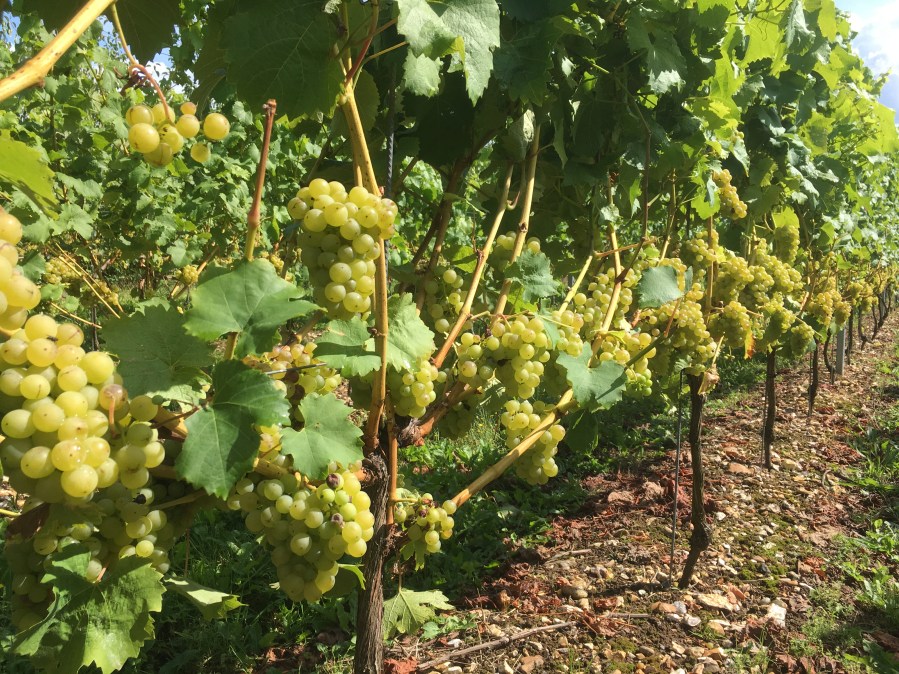Last month in this column, Gary Saunders reviewed modern soil surveying techniques using the SoilQuest system. Armed with this information, how can we improve our soils and what soil improvers can be added to optimise the growth of new planted vines and the performance of cropping vineyards?
Strong establishment of young vines is fundamental in securing the long-term health of a vineyard, for example against Grape Trunk Disease (GTD), and also to generate productive returns from investment as early as possible. Pre-planting preparations are a once in a lifetime opportunity to improve soil conditions to depth throughout the soil profile. Key areas to focus on include:
υ Drainage to prevent excessive water retention
υ Alleviation of compaction by subsoiling
υ Raising porosity with organic matter
υ Increasing fertility with applied fertilisers
Acidity is straightforward to correct with lime, and heavier soils could be improved with gypsum. High alkalinity is difficult to change but the associated problem of low iron availability can be addressed with bulk applications of ferrous sulphate and ongoing liquid injection with chelated iron.
Organic matter content is very important for soil health to enhance just about every beneficial physical, chemical and biological component of the soil you can think of – pre-planting apply what you can. Ready and cost effective availability and perhaps stewardship restrictions (NVZ compliance) may however be prohibitive. For this reason, it can be better to target compost applications post-planting to the vine row only. This is more efficient and demonstrated in trials to be one of the most effective interventions to aid early establishment.
Beneficial pre- and post- planting treatments are the focus of an ongoing Agrii trial at the NIAB-EMR demonstration vineyard. The trial is not completed but mid-point indications endorse the benefit of compost and the significant improvement derived over the control from the use of liquid applied humates and ground applied CAN.
In established vineyards from year 4 onwards, a key to vine performance is balance in the canopy between vegetative growth and cropping. Pruning and training inputs to regulate productive bud numbers has a major part to play. Complementary to this is ongoing soil management either to invigorate the vine by further additions of compost, humates, and periodic sub-soiling; or de-invigorate them by planting competitive cover crops or perhaps mechanical root pruning. In any event the application of balanced nutrition is vital to prevent deficiency of any one element becoming a limiting factor to production and to replenish spent reserves to the soil.
Agrii is taking advantage of recent developments in fertiliser formulation to offer a new blended product in 2018 that incorporates the following features to deliver balanced nutrition for improved crop health and performance:
1. P-Reserve – the full benefit from applied phosphates is typically compromised in low and high pH soils by cation lock-up. P-Reserve is a powerful chelating agent that protects phosphate from precipitating out of soil solution so that it remains water soluble and fully available to the vine.
2. Polysulphate – is a UK mined and naturally high source of K, S, Mg and Ca and makes up 67% of the new Agrii Fruit blend that supplies:
υ K – with a very low chloride content
υ S – an important nutrient now below optimal levels in most UK soils from 80% reduced atmospheric deposition in the last 25 years.
υ Ca – a freely soluble source of this key nutrient important for grape berry skin strength.
υ Mg – a combination of slow release availability from the polysulphate and quicker release from added kieserite to better match crop demand.
υ B & Zn – every granule of Agrii Fruit blend is coated with a Dual-Action™ formulation of boron and zinc for both quick and extended available micro nutrition throughout the season.
υ Mn & Fe – for larger production runs, DDP (Dry Dispersible Powder) coatings are available, in particular for application to high pH soils to complement in season foliar additions.
Good soil health is vital for sustainable productivity and intelligent nutrition is the way to achieve it.




